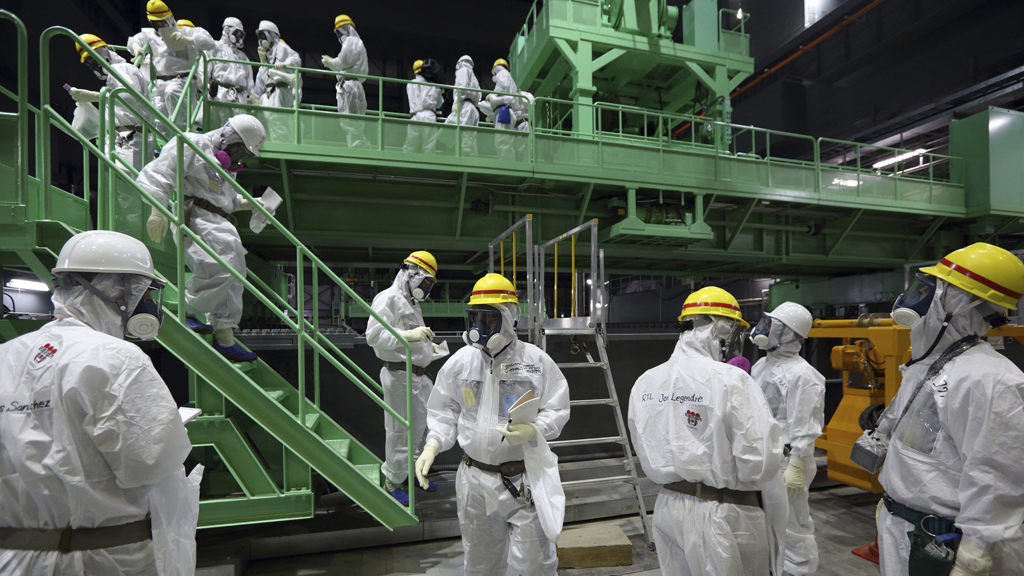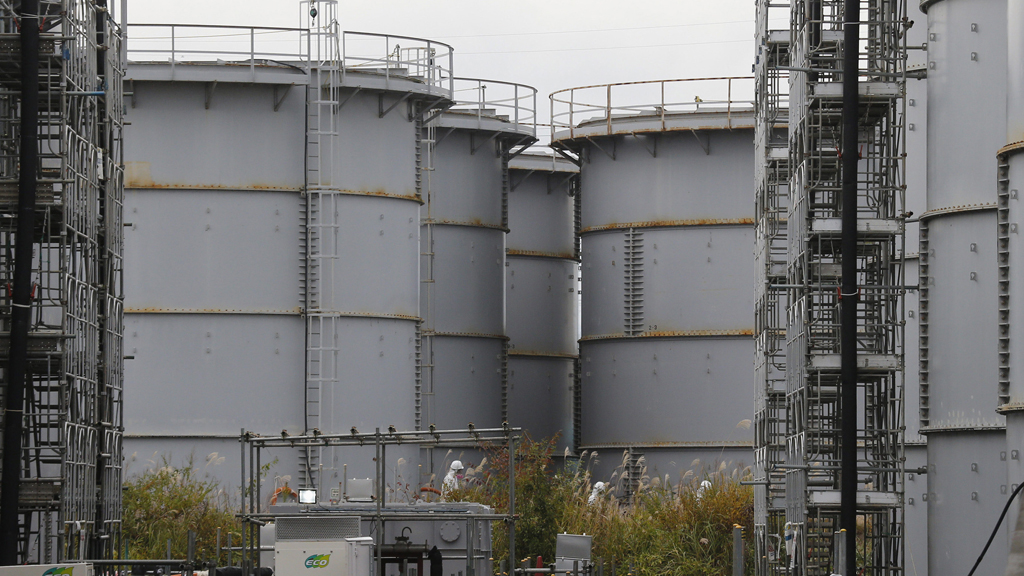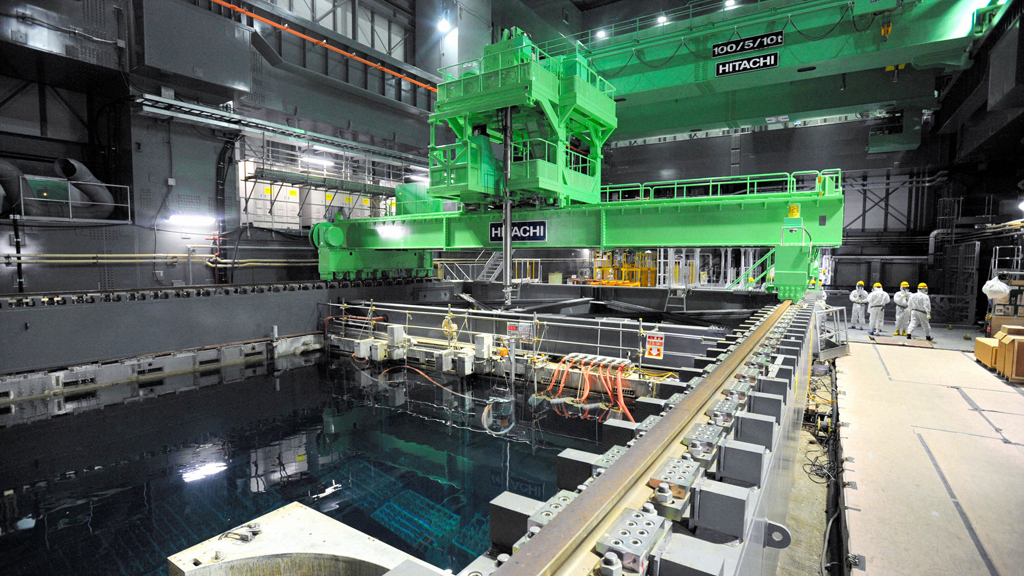Part of Fukushima plant secured by duct tape, worker claims
As Tepco opens up to the world about a dangerous operation coming up at the stricken Fukushima Dai-ichi nuclear plant, we speak to a former worker who says his legs shook as he did his work.

One day last year, nuclear clean-up worker Toyotatsu Uechi was asked to put a lid on one of the tanks at Fukushima Dai-ichi nuclear power plant in Japan.
He pulled on the yellow body suit which is required for areas at the plant with high radiation.
“My legs were shaking as I climbed the ladder,” he told Channel 4 News. And when he reached the opening, he couldn’t believe what he saw. The opening did not have a proper lid, but was instead covered with duct tape.
“In a place where safety needs to come first in terms of calming the situation, Tepco [the plant operator] has been putting band-aids just to speed things up,” he said.
My legs were shaking as I climbed the ladder. Former employee Toyotatsu Uechi
He also remembers another incident when working on patching up the floor of a reactor building, where a boss at the plant told him to focus on getting the work done in time, rather than on quality.
When contacted by Channel 4 News about these incidents, Tepco said that many of the workers at Fukushima are employed by subsidiary companies rather than Tepco, meaning that the company may not know about the incidents – however she said she had passed on the reports to people in charge at the plant and would continue to investigate such incidents of what she called “faulty workmanship”.
Channel 4 News is awaiting comment from the subsidiary company Mr Uechi was employed by.
Mr Uechi’s story is not uncommon, but observers are hoping that “faulty workmanship” lies in Tepco’s past, as the riskiest operation at Fukushima since the plant was initially devastated by the 2011 earthquake and tsunami is due to begin in the next few weeks.

In mid-November, Tepco will begin an operation to remove the spent fuel rods from the badly damaged reactor four building. This is necessary because they are currently extremely vulnerable if there is any kind of seismic event at the site.
The operation is a normal one at an undamaged nuclear plant; but the unknowns at Fukushima are great, and the damage unprecedented.
Professor Neil Hyatt, a nuclear expert at Sheffield University, told Channel 4 News the operation was a “world first”.
But Tepco insists it is on track. Last week, it even hosted journalists in the Fukushima plant, allowing them to look at the tanks. It also released a video of how the process will work, in a bid to reassure the public.
I am genuinely impressed by the thoroughness of the effort and Tepco’s contingency planning. Lake H. Barrett, expert who led the Three Mile Island clean-up
Lake H.Barrett, who oversaw the clean-up at Three Mile Island in the United States, is advising Tepco. He said he has “confidence” that the fuel removal process will happen without a hitch.
“Tepco and its partners have made extensive preparations and are employing specialized technology designed to meet the particular needs of extracting the fuel from the damaged building and safely moving it to more secure storage,” he said.
“I am genuinely impressed by the thoroughness of the effort and Tepco’s contingency planning.”
Read more: Why November is the riskiest month for Fukushima since 2011
But Mr Uechi is not convinced by the PR drive. He says that there is a growing shortage of skilled workers on site at Fukushima, not least due to problems with low pay and police investigations into allegations that yakuza, the Japanese mafia, are involved in the hiring and firing. He says he saw many workers with tattoos that are symbols of gang members in Japan.
“People are disposable,” said Mr Uechi. “In time, there will not be enough people working on the problem. Tepco does not want to pay the workers, and hires people with no knowledge of the nuclear plant, so the construction works aren’t done properly.”
Wages for contractors can be as low as 8000 yen – around £50. This compares with much higher salaries for workers involved in construction for the Tokyo Olympics.
“Why risk your life at a nuclear plant?” asks Mr Uechi.

But Tepco said it is working to deal with these issues. A spokeswoman responded: “We recognise the reports about the low wages of the workers, and we are taking them seriously.
“To avoid illegal activities such as not being paid enough, we are taking measures such as informing all the workers at Fukushima Dai-ichi the legal rights they have, and setting up places to consult about the issues.”
Tepco said it hires specialists, and has the same number of employees on site daily – 3,000 – as it did immediately after the accident. But the company also admitted it recognised reports about the influence of the yakuza.
“There were reports and we have been aware not to include them in the works, co-operating with the police.”
‘Too optimistic’
And while the staffing problems at Tepco do not inspire confidence, the fact that the company is being open about tackling them is at least a step forward from the first few months and days after the accident, when it declined to even engage with questions.
However, in many ways it has had to adapt. Just last month, a draft proposal from Japan’s ruling party recommended stripping the responsibility for cleaning up Fukushima away from Tepco entirely, with the government possibly stepping in.
It’s a suggestion which stung the company.
“We would like to do our best to decommission Fukushima Dai-ichi, having our knowledge about the site and responsibility to the accident,” a spokeswoman told Channel 4 News.
But if the problems get worse, that might not be their choice. And Mr Uechi believes that could not happen soon enough.
“Japanese people are too optimistic about the Fukushima situation, living as if nothing happened already, ” he said.
“The situation will get worse if the government doesn’t take any action.”
Additional reporting by Hiroko Nakamura.
-
Latest news
-
Taylor Swift’s new break-up album breaks records3m

-
NHS trust fined £200K for failings that led to death of two mental health patients3m

-
Sunak vows to end UK ‘sick note culture’ with benefit reform3m

-
‘Loose talk about using nuclear weapons is irresponsible and unacceptable’, says head of UN’s nuclear watchdog3m

-
‘There wasn’t an Israeli attack on Iran,’ says former adviser to Iran’s nuclear negotiations team7m

-




